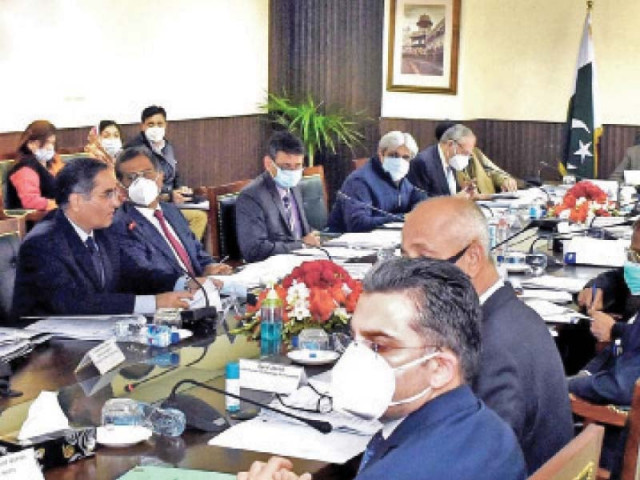Govt to set up Tax Policy Unit
Body will highlight revenue leakages, suggest measures to boost tax collection

The PTI government has approved the establishment of an independent Tax Policy Unit (TPU) with the objective of improving taxation governance, as it would point out revenue leakages in the system, recommend rationalising rate of taxes and suggest measures to mobilise higher revenue in tax collections.
The creation of TPU would partially withdraw the powers of policy making for taxation from the Federal Board of Revenue (FBR), but improve its function to collect revenue in taxes in the country.
It would work under the Ministry of Finance (Finance Division) and report to finance minister unlike FBR, which operates under the domain of the Revenue Division. The government was working on creation of TPU for over two years now; since November 2018. The board would have members from different sectors, including businessmen from the private sector, FBR officials, academics, think tanks, fiscal and economic experts, and government officials.
“The rationale of establishment of the diversified tax policy unit (having almost all the stakeholders on board) is that it would give balanced recommendations to improve taxation governance…and revenue collection,” an official at the ministry told The Express Tribune.
The finance ministry and the FBR’s Policy Board have, in principle, approved establishment of Tax Policy Unit at a meeting held in Islamabad on Thursday.
“Final decision for its (TPU) formation lies with the federal cabinet,” the official said, adding now a summary, which would seek the cabinet nod on establishment of the unit, would soon be sent to the cabinet.
“There is no clear-cut timelines defined for its establishment, but we are aiming at doing so as early as possible,” the official said.
“The TPU policy recommendations would first land at Economic Coordination Committee (ECC) of the cabinet, while the federal cabinet would have final decision on the recommendations,” another official at the ministry said.
Federal Minister for Finance and Revenue Abdul Hafeez Shaikh chaired Thursday’s meeting held at the FBR headquarter. It was the fifth meeting of the FBR Policy Board, the ministry said in a press statement.
Federal Minister for Privatisation Mohammad Mian Soomro, Adviser to the PM on Commerce Abdul Razak Dawood, Adviser to the PM on Institutional Reforms & Austerity Ishrat Hussain, SAPM on Revenue Waqar Masood, FBR chairman, senior members of FBR and representatives of private sector participated in the meeting. The purpose of separating tax policy from tax administration is to improve governance and tax laws in Pakistan, according to the FBR’s summary of 2018. The combination of the tax policy and revenue administration has an inherent problem of using the policy as a tool to maximise revenues at the expense of investment and economic growth.
The tax policy unit will be responsible for revenue forecasting, tax expenditure analysis, distributional analysis, economic impact analysis, cost-benefit analysis and tax indicator analysis, according to the summary approved by the cabinet in 2018.
On Thursday (Feb 11), FBR made a presentation regarding establishment of Tax Policy Unit in accordance with the decision of the cabinet dated November 29, 2018.
“Members of the Policy Board gave valuable input highlighting the advantages of keeping tax policy function independent of administrative function,” the statement added.
“After due deliberation, the chair accorded approval for the establishment of Tax Policy Unit under the administrative control of the Finance Division,” it said.
A new setup would be created that will include members from the FBR and also engage fiscal and economic experts from academia, think tanks and private sector to present holistic proposals for mobilising revenue generation with greater autonomy. “Tax Policy Unit would work out policy recommendations for domestic tax collection on the lines of the National Tariff Commission, which operates under the Ministry of Commerce,” it added.
“The finance minister further directed the FBR to expedite the process of income tax refunds of less than Rs50 million (each recipient) to uphold commitment of the government to facilitate taxpayers,” according to the statement.
FBR’s Technical Committee apprised the Policy Board about the measures taken to identify anomalies and simplify the taxation system for better understanding of the business community. FBR requested to include senior representatives from the Ministry of Commerce and Ministry of Industries & Production for better coordination and effective policy making in this regard.
Complaint Oversight Committee’s (COC) chairman briefed the Policy Board about the working of a newly developed complaint portal which is currently running on trial basis. The complaint resolution system is designed to facilitate businessmen, traders, Small and Medium Enterprises (SMEs) and large taxpayers. All complaints can be filed at one place. SOPs for complaint resolution and oversight by COC are being finalised and a system would be formally launched soon. The chair directed to disseminate relevant information about the working of complaint registration mechanism and ensure the contact details are readily available for public consumption.
Published in The Express Tribune, February 12th, 2021.
Like Business on Facebook, follow @TribuneBiz on Twitter to stay informed and join in the conversation.



















COMMENTS
Comments are moderated and generally will be posted if they are on-topic and not abusive.
For more information, please see our Comments FAQ